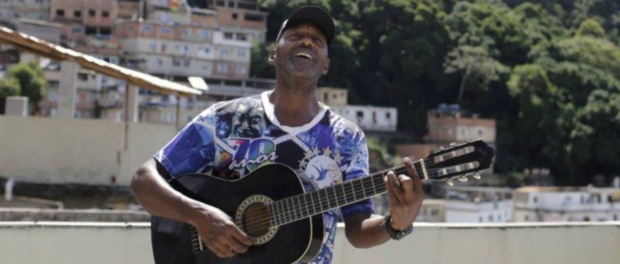
For the original article in Portuguese by Geraldo Ribeiro published in Extra click here. This is our latest article on the new coronavirus as it impacts Rio de Janeiro’s favelas and in partnership with the Behner Stiefel Center for Brazilian Studies at San Diego State University.
With a view of the waterfront from Leblon to Leme and, in the other direction, the Christ the Redeemer statue, the roof at the top of a three-story property in Vidigal has always invited contemplation. But the space, shared by three families, has never been as busy as it is now that isolation has been adopted in Rio de Janeiro as a protective measure against Covid-19. The same phenomenon has begun to take place in other communities: typically a place for barbecuing, sunbathing, and flying kites, favela rooftops are becoming offices and gyms during quarantine.
“People can’t go outside, but even at home we need to keep active and be connected with the world, so we ended up going to the roof,” observes William de Paula Lucas, 40, or “Ninho,” who transformed his rooftop in Vidigal into a home office and space for practicing capoeira.
A physical education teacher and guardianship councilor (Brazil’s equivalent to Child Protection Services), Lucas lives alone on the top floor of the building. He has now moved his office to the roof. From there, with his mobile phone and laptop, he takes part in video conference meetings, gives online classes, and helps local families in need of food parcels and medicine.
With the gym where he practices capoeira closed, Ninho started using the rooftop to train. His father, Paulo Vicente, 64, who works for Rio’s transport services and lives in the same building, uses it to sunbathe.
In the house next door, Liviete Alves da Silva is sad that she hasn’t been able to go to the beach for 15 days, despite being able to see it from her window. But her great-niece Eduarda, 7, wasted no time: in the heat of last Thursday, she cooled down with a hose bath on the roof. Even her neighbor Mara Soares, 55, who doesn’t have her own rooftop, had a go, avoiding the crowds on the beaches: “It is the safest option,” she said.
Resident of Ladeira dos Tabajaras in Botafogo, Raylton Moreira dos Santos, 27, who is self-employed, trains jiu-jitsu at a club in Leblon. With classes suspended, he set up a mat on the rooftop of the house. Now, the purple belt trains twice a day there. His wife, Renata Werneck Sodré, 29, who is an assistant nurse, uses the space to do her video classes in Law. “Now, whoever has a rooftop in the community is king,” says Santos.
Social isolation in communities is “observed” from the distance between the rooftops. The proximity of the houses favors conversations between neighbors, with each in their own space. That’s what the bricklayer Carlos Augusto Jacob, 49, does. But what the neighborhood really likes is when he picks up his guitar to play some cords. They even form an audience atop their houses.
“At night I come here to play guitar. Sometimes, I join people on the other rooftops to listen and applaud. I play everything from samba to forró, but what I really like is evangelical music,” he said, explaining that some families resort to the rooftops for their prayers as well because they can’t go to church.
Resident of Morro da Babilônia in Leme, Nilton Rodrigues Silva, 71, is retired. He misses the daily fishing on the Fisherman’s Path (Caminho do Pescador), which he can see from his roof and is closed off now. Unable to leave the house, the rooftop has become his territory.
“I spend most of the day here. I do crosswords and I make the most of this amazing view. It is currently the busiest part of the house,” he says.


